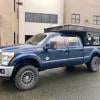Trying to work smarter not harder...
Picking up a new Hawk in December to be put on my 2014 F-350. Specced with a single 79Ah AGM battery and "pre-wired" for solar (no charge controller installed). I plan on adding a second 79Ah battery right away and eventually solar.
I'll be doing a lot of winter camping and I think I would like to install a DC-DC charger. (more amps= less truck idling time to top off batteries if needed??). I don't know if the 2014 F350 has a "smart alternator" or not.
My real question is... should I ask the installer, Mule Expedition Outfitters, to install 4AWG wiring on initial install instead of the smaller diameter normal wiring harness. So that I don't have double efforts in a month or so when I want to install the DC-DC charger and presumably need heavier gauge wire? If I don't install a DC-DC charger, will having 4AWG wiring from truck to camper increase the amps I see come across while driving anyway, perhaps receiving me of the necessity of the DC-DC charger?
















